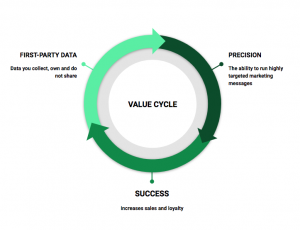Marketing is the process of creating, communicating, delivering and exchanging offerings that have value for customers. The digital marketing industry is built on a foundation of consumer data used to define a target market – the trouble is that the majority of consumer data used by marketers is predefined and acquired from multiple sources. This results in weak campaign planning, performance data that is not aligned with business goals, and ultimately, sub-optimal results.
The upcoming GDPR legislation wipes out the commoditized third-party data industry and leaves marketers with a single option when it comes to using data for marketing purposes: collect it yourself.
Consumers’ right to privacy and control over personal data is at the heart of the GDPR, however, it also places brands in control and provides a real opportunity to distinguish audience outreach efforts using first-party data.
Well ahead of GDPR enforcement, L’Oreal Europe, and Santander have shown that using first-party data creates a competitive advantage. L’Oreal used limited first-party e-commerce sales data alongside publishers’ first-party data to deliver meaningful messages to real consumers proving that brands do not need vast data sets to drive effective marketing campaigns targeted to new audiences.
Santander saw a 12% increase in loyalty (defined as someone who has an account and at least one other banking product) after switching from third- to first-party data to inform about marketing efforts.
Also Read: Data 101 to Set Your Data-Driven Marketing Ablaze
Ignoring data you already own e.g. app user data, point-of-sale data, email database/CRM records is like ignoring employee performance reviews when deciding who should be promoted. Only first-party data can highlight who your best customers are and which marketing channels they are found within.
Taking control and responsibility of data that consumers place in your trust should be marketers’ number one priority. Not only to avoid the potentially business-destroying fines for misusing data but to deliver highly targeted ads to precisely defined audience segments.
Another way to think of it is as a value cycle.

Many brands do not have first-party data or are unsure whether the data they have has been collected in a way that is GDPR compliant i.e. consumers have given explicit consent for their data to be collected and used for clearly defined marketing purposes.
In this situation, organizations must act swiftly to generate this data organically. This can be achieved through newsletter registrations, online interactions (downloads, webinars, and surveys, etc), offline interactions (in-store promotions, store purchases, tradeshow booth visits, etc.), mobile app interactions, co-sponsoring and co-registration marketing.
In the age of privacy, being one of the elite few businesses that are able to generate and own first-party leads will be the biggest advantage you can have, so don’t settle for data collection practices that only take you halfway to your goals.
Also Read: 3 Data Hacks That Will Increase Marketing Effectiveness











